Eyke primary school sets up charity to fund music education
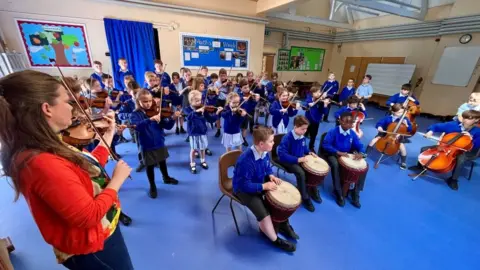 Martin Giles/BBC
Martin Giles/BBCA rural primary school that puts music at the "heart" of its school day has set up a charity to fund "quality music education from experts".
Eyke Church of England Primary near Woodbridge, Suffolk, said music had helped enhance overall learning.
Children are taught class lessons by music specialists and given the option to learn an instrument.
The government said it provided funding so all children could have at least an hour's music education a week.
Head teacher Lucie Fairweather said: "I'm not musical myself, but I realise music brings another dimension to the school, it's fantastic for the children's self-confidence."
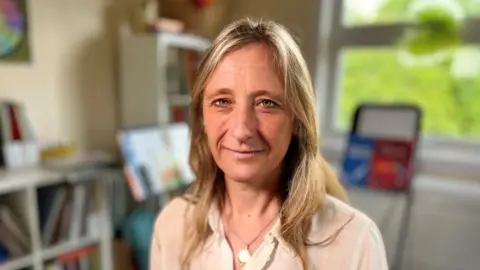 Martin Giles/BBC
Martin Giles/BBCThe music programme was set up seven years ago, and 57 of the school's 103 pupils are currently having one-to-one music lessons.
Eyke Primary also runs choirs, ensembles and orchestras - all with qualified music teachers and voice coaches.
The head is supported by musician and teacher Maria Dobing, who is the founding director of the school's music programme.
"It goes beyond music, because we are nurturing children's aspirations, work ethic, learning to listen, learning to contribute, to be part of a team," she said.
"You've also got the knock-on effects of learning an instrument, in supporting language, in supporting maths, in supporting fine motor skills and co-ordination.
"We can't breed aspiration if we foster mediocrity. We have to show them what excellence is if they're going to aspire to that.
"Every time we have any kind of a celebration, music is such a big part of it - look at the Coronation - and we need a pipeline, that pipeline is drying up."
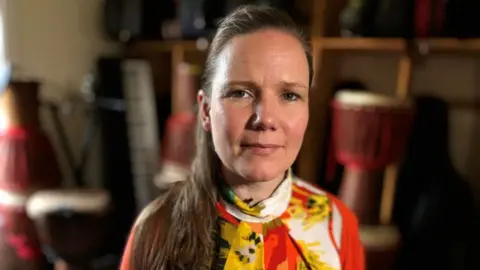 Martin Giles/BBC
Martin Giles/BBCMs Fairweather said rural schools faced particular challenges in providing a music education.
"There's a real disparity between a small rural primary and a large town school," she said.
"As soon as you try to move them anywhere [to see a concert] it costs £150 for a bus. Budgets are very, very tight and we have had to prioritise music.
"You can make it work, but it has to be at the heart of the school, so it has to be a major feature of the school day.
"But to be honest we can't afford it, which is why we are having to establish a charity, so that we can access other funding streams."
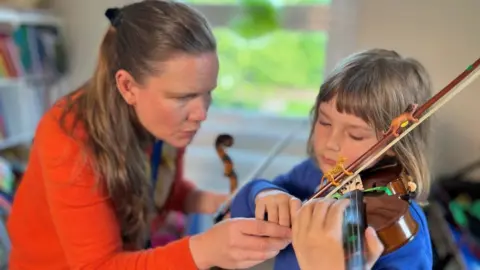 Martin Giles/BBC
Martin Giles/BBCParent Danielle, who has no musical background herself, has two children at the school, learning violin and cello.
She said her children have benefitted from "discipline, resilience, but also absolute joy".
"So resilience, it's a long-haul, and that's not easy for anybody actually, let alone young children," she said.
"You practise when you don't feel like it. You make commitments and you see them through.
"It's made me realise how this should be offered to all children."
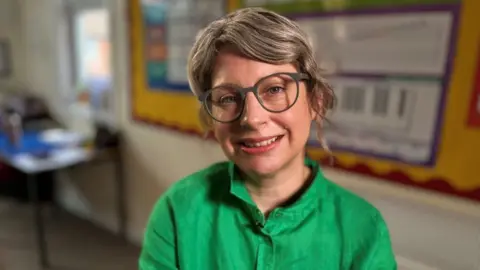 Martin Giles/BBC
Martin Giles/BBCA Department for Education (DfE) spokesperson said it was "committed to ensuring that every young person has access to a high-quality music education".
"We have allocated £79m per year in funding for the Music Hubs programme to 2025," the spokesperson said.
"We will continue to work closely with Arts Council England whilst taking on feedback from schools and the wider sector to ensure that there is support in every local area."
Funding for music in Suffolk schools, dispensed by the Arts Council on behalf of the DfE, is expected to fall from £937,768 in 2018-19 to £935,697 in 2023-24.
You can see more on this story on Politics East on BBC One on Sunday, 28 May at 10:00 GM and on BBC iPlayer afterwards.

Find BBC News: East of England on Facebook, Instagram and Twitter. If you have a story suggestion email [email protected] or get in touch via WhatsApp on 0800 169 1830
